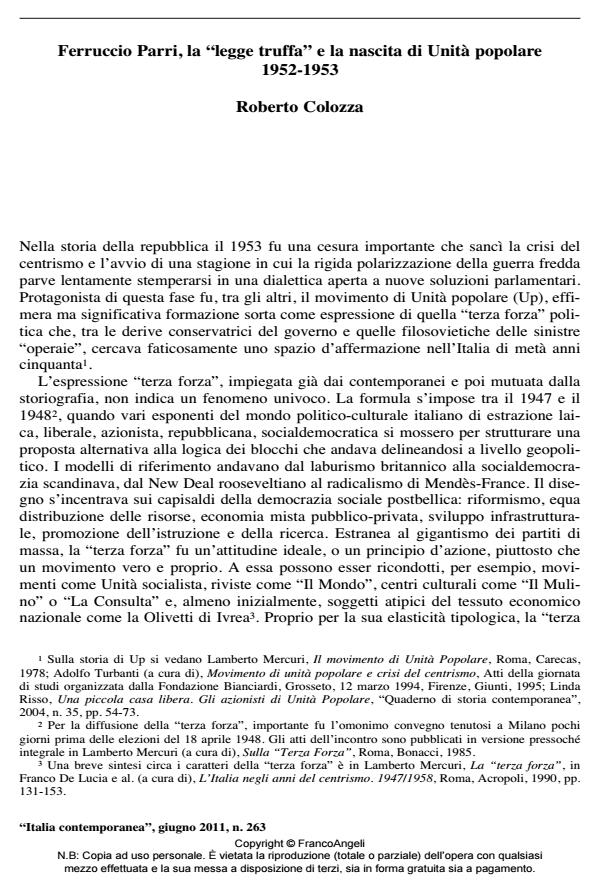Ferruccio Parri, the "scam law" and the origins of Unità Popolare 1952- 1953
Journal title ITALIA CONTEMPORANEA
Author/s Roberto Colozza
Publishing Year 2011 Issue 2011/263
Language Italian Pages 22 P. 217-238 File size 559 KB
DOI 10.3280/IC2011-263003
DOI is like a bar code for intellectual property: to have more infomation
click here
Below, you can see the article first page
If you want to buy this article in PDF format, you can do it, following the instructions to buy download credits

FrancoAngeli is member of Publishers International Linking Association, Inc (PILA), a not-for-profit association which run the CrossRef service enabling links to and from online scholarly content.
This essay investigates the reasons why Ferruccio Parri left the Italian Republican Party (PRI) to contribute to the creation of Unità popolare, the poll alliance of actionist roots uniting the Pri and Psdi left wings in conflict with their respective party. The genesis of UP. Stemmed from the debate on the electoral bill tabled by the De Gasperi Cabinet and passed by Parliament in March 1953. Dubbed "scam law" by the opposition, it aroused harsh contrasts on the characters of pluralistic democracy and the means apt to defend its integrity, in particular within the so-called "third force", the lay area fostering a political project alternative to the counter-position of blocs that had taken shape at geopolitical level. Anti-Communism and anti-Fascism polarized the confrontation. Though hostile to the existing proportional system, Parri feared the law in question would help the advent of a new Fascism under clerical guise, since it granted a substantial majority premium to the coalition which would gain the absolute majority of votes. In June 1953 polls, however, no force in the lists reached that threshold, and so UP won its battle and started off an original political experience that was to find in Parri its prominent figure. Parole chiave:
Keywords: Ferruccio Parri, Unità popolare, Action Party, "scam law", "third force", anti- Fascism
- East and West Entangled (17th-21st Centuries) Guido Samarani, pp.181 (ISBN:979-12-215-0242-8)
Roberto Colozza, Ferruccio Parri, la "legge truffa" e la nascita di Unità popolare 1952- 1953 in "ITALIA CONTEMPORANEA" 263/2011, pp 217-238, DOI: 10.3280/IC2011-263003